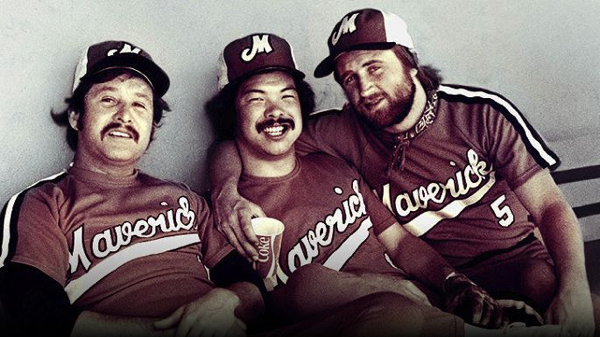Movie review by Greg Carlson
Warm, funny, engaging, and foul-mouthed, “The Battered Bastards of Baseball” recounts the almost too-good-to-be-true rise and fall of the Portland Mavericks, a colorful minor league club that operated from 1973 to 1977 in the Class A Northwest League. Owned and operated by the irrepressible Bing Russell – one-time ballplayer, veteran cowboy actor, entrepreneur, raconteur, father to Kurt and grandfather to “Bastards” co-directors Chapman and Maclain Way – the Mavs were the embodiment of nearly every underdog and anti-establishment baseball cliché imaginable. Functioning as the only team in the league independent of the majors, the Mavs would, in their half-decade of existence, write one of the most endearing chapters in American baseball history.
The Way brothers capitalize on Bing Russell’s prodigious collection of memorabilia, combing through an impressive archive of photographs, motion picture film, and newspaper clippings to visually enhance the film’s set of interviews with many of the people closely affiliated with the Mavericks. Russell died in 2003, but his personality dominates the film. A devoted student of baseball, Russell fell hard for the game as a kid, eventually becoming “peanut smuggler” and unofficial rabbit’s foot to a classic New York Yankees roster that included Lefty Gomez, Joe DiMaggio, and Lou Gehrig – who gave Russell the bat used to hit the Iron Horse’s final home run.
After an injury cut his playing career short, Russell ended up in California, where he appeared in “The Magnificent Seven” and, in his own words “never solved a case” as Deputy Clem Foster on “Bonanza.” Russell’s first love and second wind, however, arrived in an opportunity to revitalize minor league baseball in Portland, Oregon, when the Triple-A Beavers franchise relocated to Spokane. “Bastards” paints a vivid picture of the Maverick tryouts, a real life variation on the ragtag assemblage of rejects, has-beens and never-weres of “Major League.” Russell’s emphasis on fun attracted characters that would have been right at home in “The Bad News Bears.” Pitcher Rob Nelson notes, “Most of the Mavericks had a little bit of a paunch. They led the league in stubble.”
Apart from the internal Mavs film footage, the Ways tap into a pair of key visual artifacts. The first is NBC’s “The Baseball World of Joe Garagiola.” During a visit to Portland, the sportscaster collected enough material for two episodes in a single day of shooting. The broadcasts gave the Mavericks national exposure. The second is Johnny Carson’s interview on “The Tonight Show” with Mavs pitcher Jim Bouton, whose controversial tell-all “Ball Four” earned the former Yankee a reputation as persona non grata. Bouton is worthy of his own feature documentary, and the interviewees in “Bastards” speak of him with great affection. Unfortunately, Bouton does not provide any new on-camera interview material for the film that bears a title he coined.
Kurt Russell, who actually played for the Mavericks, is the most famous subject interviewed for the movie, but Nelson, Jon Yoshiwara, Carren Woods, Frank Peters, Jim Swanson, and batboy Todd Field – yes, the same Oscar-nominee who directed “In the Bedroom” and “Little Children” – speak with eloquence and salt to the “Maverick Miracle.” That miracle encompasses everything from the invention of Big League Chew bubble gum to the flaming broomsticks signaling “It’s a Jogarza!” when the Mavericks completed a sweep. “The Battered Bastards of Baseball” flies by with as much zip as one of Bouton’s best fastballs. You need not be a hardcore baseball fan to enjoy the ride.
